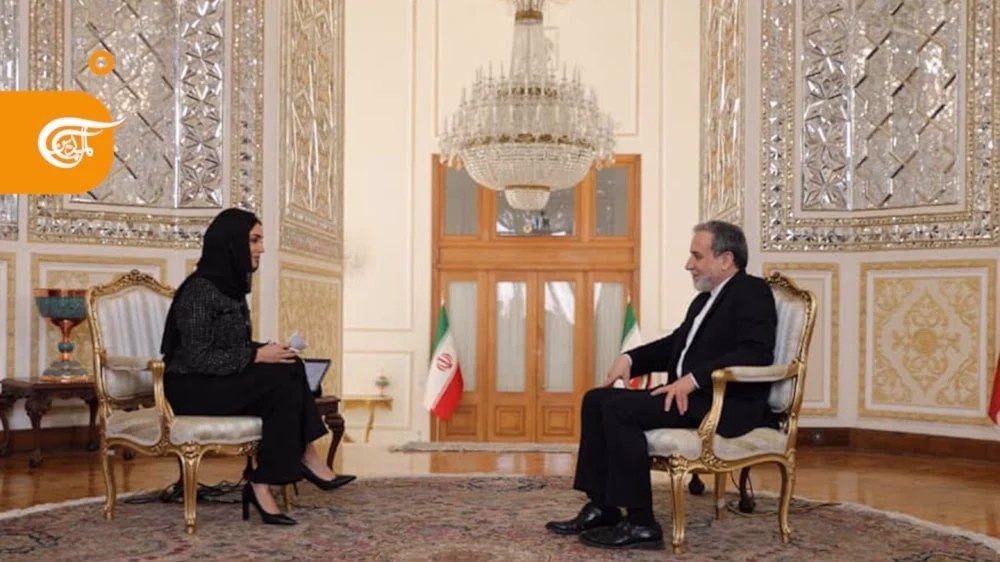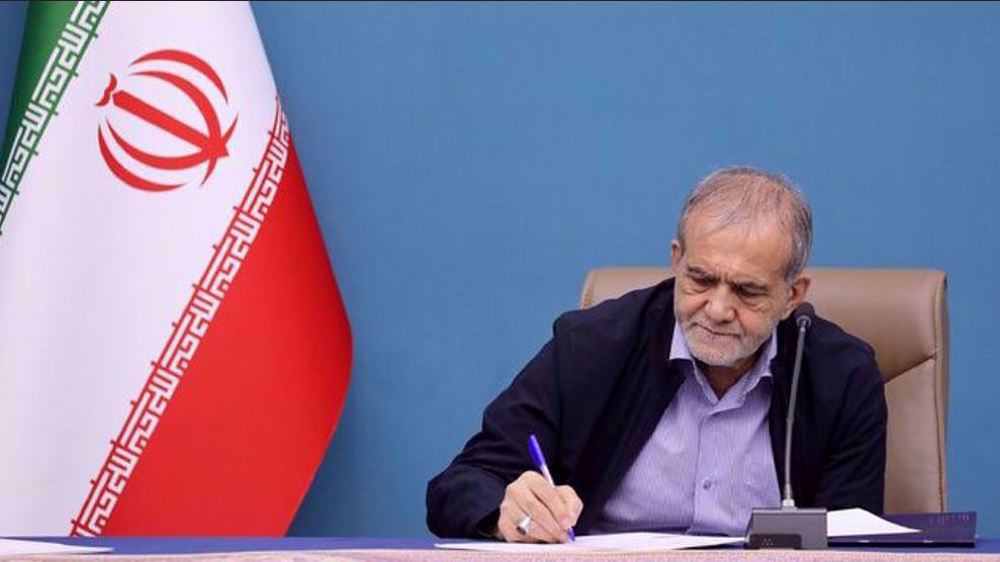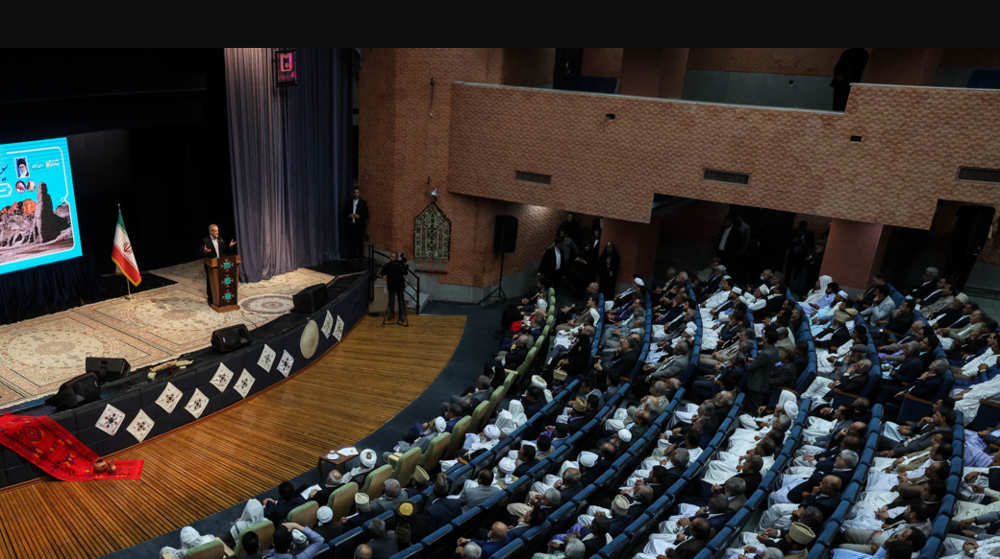Presidents of Iran, Russia, Turkey hold Syria talks in Sochi
The Iranian, Russian and Turkish presidents hold a trilateral meeting on the Syria crisis in the Black Sea resort of Sochi.
The Wednesday talks between Hassan Rouhani, Vladimir Putin and Recep Tayyip Erdogan come as Iran, Russia and Turkey are acting as the guarantors of a ceasefire that took effect in Syria late last year.
Rouhani lauded the defeat of the Daesh terror group in Iraq and Syria, but underlined the need for continued battle against terrorism until the eradication of all Takfiri terrorist outfits in Syria.
He blamed foreign interference for the conflict in Syria, saying certain countries claiming to be advocates of democracy wrecked havoc in the Arab country to achieve their goals in the region.
“If regional nations and countries are to learn a lesson from the fabricated crisis in Syria today, it is that they should know certain powers claiming to advocate democracy and human rights spare no effort like using terrorism and violence to achieve their short-sighted objectives in the region, Rouhani said.
“The lesion that these powers have not learned is that repercussions of terrorism and extremism will not be confined to a region other parts of the world will not be safe from the ominous phenomena,” he added.
He said that after the defeat of Daesh, the sponsors of terrorism were now seeking to create tensions and cast doubt on efforts by certain regional countries, including Iran, and resistance fighters aimed at restoring stability to the region.
The Iranian president expressed regret that that certain countries followed the US and Israel’s suit in creating rifts and division among regional nations, noting such countries are accountable for their malicious policies of fomenting ethnic and religious rifts.
Elsewhere in his remarks, Rouhani stressed that Iran pursued an approach based on cooperation, not competition, coordination not confrontation, peace not warmongering and respecting the will of nations rather than following foreign powers.
He said that no foreign intervention was acceptable in Syria, adding that any foreign military presence in the Arab country may only be acceptable if it is by the invitation of the Damascus government.
The role of the international community in the future of Syria should be to contribute to efforts to restore stability, alleviate the sufferings of people and reconstruct the country without any political motive.
Speaking alongside Putin and Rouhani, Erdogan pointed to preliminary meetings prior to the Sochi tripartite summit, saying the consolidations yielded positive and tangible results, but stressed that more efforts were needed to find an effective solution.
The Turkish leader said it was vital for all parties to contribute to a political solution in the Syrian crisis that would be acceptable for the Syrian people.
For his part, Putin called for "concessions and compromise" from all parties in Syria's conflict to end the crisis in the country.
Putin added that there was a "real chance" to end Syria's crisis, saying Russia, Turkey and Iran had managed to prevent the collapse of the war-torn country.
Iran, Russia, Turkey discuss Syrian people's congress in Sochi
Following their meeting, the three presidents attended a press conference and issued a joint statement.

During the press conference, Rouhani said the tripartite meeting discussed holding an all-Syrian congress, which will see representatives from all sides in Sochi to exchange views on the fate of the country and pave the way for the drafting of a new constitution and elections.
Iran, Russia and Turkey invite all countries to help peace in the Middle East region, including in Syria, contribute to the reconstruction of Syria and return of refugees to their homes, he added.
Putin also said that the three leaders had agreed to a "congress" of Syria's government and opposition forces in Sochi, adding that had instructed their diplomats, security and defense bodies to work on the composition and date of the congress.
The congress would "gather representatives of different political parties, internal and external opposition" to discuss "the parameters of the future state," Putin said, adding that it would be "a stimulus for activating the efforts for Syria regulation in the framework of the Geneva process."
Putin stressed the three presidents also agreed to step up efforts to finish off "terrorist" groups in Syria.
Erdogan also emphasized that the three nations would help stage a meeting of Syrian groups hosted by Russia and that they agreed to keep working on the peace process in Syria.
Also in their joint statement after the talks, Putin, Rouhani and Erdogan reaffirmed their strong commitment to the sovereignty, independence, unity and territorial integrity of Syria.
They also stressed the determination of the three countries to continue working together to help restore peace in Syria and praised their cooperation aimed at safeguarding a ceasefire in Syria that came during the intra-Syrian talks brokered by the three countries in the Kazakh capital, Astana.
Iran, Russia and Turkey are acting as the guarantors of the ceasefire.
Meanwhile, in a post on his Twitter account on Wednesday, Iranian Foreign Minister Mohammad Javad Zarif said the Sochi summit aimed to “help Syrian people finally secure a just and lasting peace.”
“In Sochi with President Rouhani & Chief of Staff Bagheri at a historic summit with our counterparts from Russia and Turkey to help Syrian people finally secure a just and lasting peace. Moving in the right direction,” he wrote.
In Sochi with President Rouhani & Chief of Staff Bagheri at a historic summit with our counterparts from Russia and Turkey to help Syrian people finally secure a just and lasting peace. Moving in the right direction.
— Javad Zarif (@JZarif) November 22, 2017
Prior to the meeting of the three leaders, Chief of Staff of the Iranian Armed Forces Major General Mohammad Baqeri attended a tripartite meeting with his Turkish and Russian counterparts in Sochi to exchange views about ways to enhance trilateral defense cooperation and to discuss the latest developments in Syria as well as trilateral cooperation on the fight against Daesh.
Meanwhile, in a separate tweet on Wednesday, Zarif made an apparent reference to a meeting between US President Donald Trump and Saudi King Salman bin Abdulaziz in May in Riyadh, saying there’s “no need for empty words or gimmicks -- including glowing orbs -- when you’re busy actually working for peace and against terror.”

During Trump's visit to Saudi Arabia to attend a summit of Arab countries, an image circulated on media outlets showing Trump, King Salman and Egyptian President Abdel Fattah el-Sissi with their hands on a basketball-sized glowing orb reportedly to mark the opening of a Saudi center for "combating extremism."
VIDEO | Former FBI agent criticizes US Congress for 'outright corruption'
IRGC chief urges Muslim countries to cut aid routes to Israel
'New chapter in cooperation': Iran, Venezuela sign new MoUs
Jordan sentences former lawmaker for supporting Palestinian resistance
Basij volunteer forces hold massive drills in southwestern Iran
Israeli war criminals 'not welcome', US city says after ICC ruling
US vetoing of Gaza ceasefire resolution ‘disgraceful’: Iran’s UN envoy
VIDEO | IAEA adopts anti-Iran resolution tabled by E3









 This makes it easy to access the Press TV website
This makes it easy to access the Press TV website